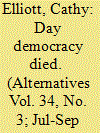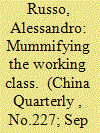| Srl | Item |
| 1 |
ID:
092089


|
|
|
|
|
| Publication |
2009.
|
| Summary/Abstract |
The current fashion for good governance and promoting democracy as an integral element of development is ironically having depoliticizing effects because of its articulation with a technocratic and Westernized vision of what a good society might be like. Proceeding empirically and using texts relating to the assassination of Benazir Bhutto, this article demonstrates how discourses of democracy and development are mobilized in the contemporary international space, enabling the discursive taking of sides: for "democratic development" and against "Islamic extremism," in ways that elide other possible modes of seeing. "Democratic development" constitutes, and is constituted by, a "Western" (and British) identity in ways that are seductive, but also disciplinary: In particular, they turn out to produce and reproduce a particular set of gender relations as well as exhorting British Muslims to "fit in" with this identity. This exclusionary logic also transposes struggle over these power relations into an undemocratic international space. One key consequence of its mobilization is precisely the closing down of space for political resistance through democratic means, which I argue is not only ironically highly undemocratic, but also dangerous.
|
|
|
|
|
|
|
|
|
|
|
|
|
|
|
|
| 2 |
ID:
148766


|
|
|
|
|
| Summary/Abstract |
A number of prolonged political experiments in Chinese factories during the Cultural Revolution proved that, despite any alleged “historical” connection between the Communist Party and the “working class,” the role of the workers, lacking a deep political reinvention, was framed by a regime of subordination that was ultimately not dissimilar from that under capitalist command. This paper argues that one key point of Deng Xiaoping's reforms derived from taking these experimental results into account accurately but redirecting them towards the opposite aim, an even more stringent disciplining of wage labour. The outcome so far is a governmental discourse which plays an important role in upholding the term “working class” among the emblems of power, while at the same time nailing the workers to an unconditional obedience. The paper discusses the assumption that, while this stratagem is one factor behind the stabilization of the Chinese Communist Party, it has nonetheless affected the decline of the party systems inherited from the 20th century.
|
|
|
|
|
|
|
|
|
|
|
|
|
|
|
|
| 3 |
ID:
111232


|
|
|
|
|
| Publication |
2012.
|
| Summary/Abstract |
UNRWA's reconstruction of Jenin refugee camp following the massive destruction by Israel in April 2002 was the largest humanitarian intervention during the second intifada. This article uses the Jenin project as a lens through which to critically examine the minimalist humanitarian paradigm underwriting the agency's relief-centered mandate. Reviewing the negotiations between UNRWA planners and local refugee committees, the author highlights the tension between the agency's politically "neutral" technical vision and the refugees' needs and wishes. While recognizing UNRWA's crucial role, the author regrets that in expanding its operations beyond relief provision, the agency opted for a more traditional (liberal) community-based development framework rather than a rights-based approach, resulting in a depoliticization that undermines the community's struggle for its rights.
|
|
|
|
|
|
|
|
|
|
|
|
|
|
|
|